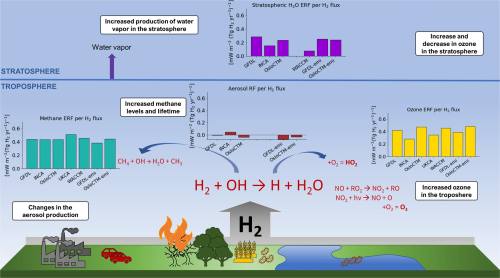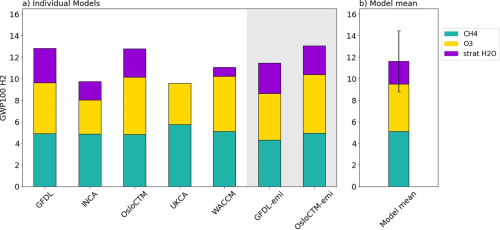Unlike exhaust from burning coal and gas that contains CO2, burning hydrogen emits only water vapor and oxygen. Rather, it is the leaking of hydrogen from production, transportation and usage that adds to global warming.
Hydrogen is not a greenhouse gas, but its chemical reactions in the atmosphere affect greenhouse gases such as methane, ozone, and stratospheric water vapor. In this way, emissions of hydrogen can cause global warming, despite its lack of direct radiative properties.

The main changes in the radiative forcing due to 1 Tg flux of hydrogen; methane (green bars), ozone (yellow), stratospheric water vapor (purple), and aerosols (red). Sand et al.
The study was led by Dr Maria Sand, a senior scientist at CICERO, and her colleagues with collaborators from the UK, France, and the US, and was funded by the Research Council of Norway with contributions from five hydrogen industry partners.
The climate effects of hydrogen have been an under-researched topic. However, a few papers based on single model studies confirm our estimated global warming potential (GWP100) of 11.6.
We used five different atmospheric chemistry models and investigated changes in atmospheric methane, ozone and stratospheric water vapor. Hydrogen interacts with various biogeochemical processes. In our estimates, we have included soil uptake, photochemical production of hydrogen, the lifetimes of hydrogen and methane, and the interactions between hydrogen and methane.
—Dr Sand

The GWP100 of hydrogen. Sand et al.
The study is the most comprehensive assessment of the climate effect of hydrogen to date.
A global warming potential of 11.6 is significant, and our study clearly shows the importance of reducing hydrogen leaks. We lack the technology to monitor and detect hydrogen leaks at the scale needed, but new technology is being developed as the industry adapts.
—Dr Sand